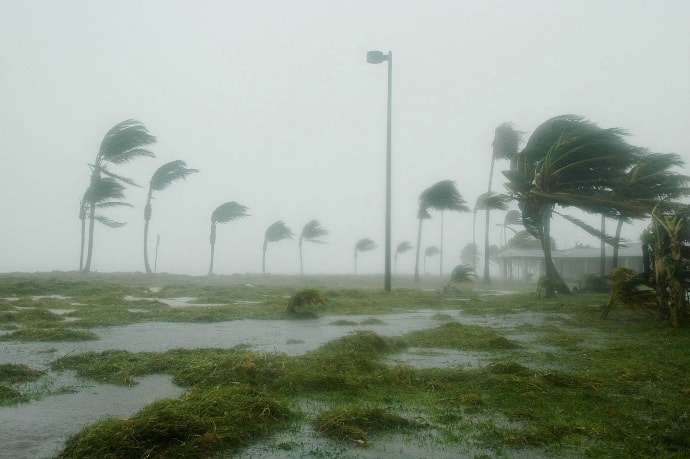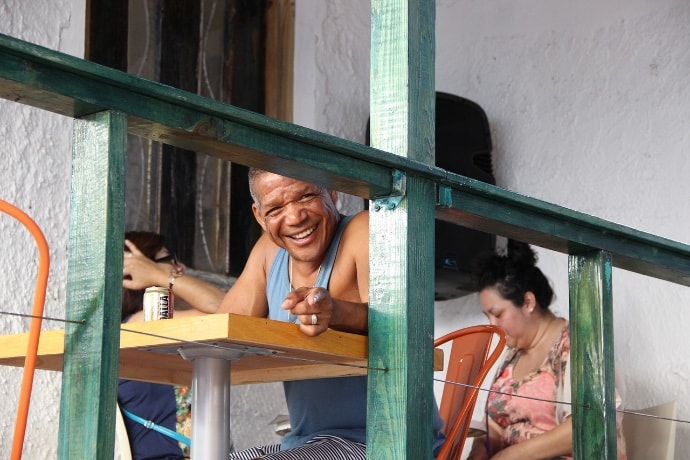
Hurricane in the tropics. Photo: Unsplash
By Tracey Compton, Mercy Corps Senior Media and Communications Coordinator
The Caribbean has been labeled ground-zero for climate change, with each hurricane season as unpredictable as the last. Climate change is making hurricanes and other climate disasters more frequent, more intense and less predictable – with community preparedness education increasingly essential. This makes the region an ideal setting for testing new approaches to climate resilience that focus on education and building responsive community networks. Drawing on proven results from our experience in Puerto Rico after Hurricane Maria, Mercy Corps’ is partnering with local organizations to drive resilience in a region that has faced catastrophic devastation and will remain incredibly vulnerable to climate disasters. The Resilience Hub model demonstrates what is possible when you center local communities in climate resilience and emergency preparedness efforts. This will become increasingly urgent in the Caribbean and other climate-vulnerable regions as the climate crisis intensifies.
Mercy Corps has been working in the Caribbean for 14 years, and we’ve learned that knowledge is one of the most adaptive tools. Our Caribbean Resilience Initiative (CRI) was born out of the realization that the traditional approach to emergency response in this region was insufficient for building resilience in communities most vulnerable to climate change.
“Small island developing states are particularly vulnerable because they have limited resources, human capital, and face some of the worst impacts of climate change,” said Allison Dworschak, Director of Mercy Corps’ Caribbean Resilience Initiative.
Emergency response in the Caribbean is a moving target, with the true extent of climate change’s impact evolving yearly. This compelled Mercy Corps to develop a smarter approach, leveraging resources in new ways through the establishment of “Resilience Hubs.”
25 Resilience Hubs across the Caribbean are community centers that have been transformed into disaster-ready facilities that can support about 2,000 people in each community. The hubs have resources such as solar energy, potable water storage, communications systems, and emergency kits and are designed to support the community with these and disaster preparedness training. The education to community members by these hubs falls into three key areas: operating and maintaining the hubs to ensure they are functional before, during, and after events like hurricanes; sustainability training to help community-based organization remain open year-round; and education for vulnerable groups, including the elderly, Indigenous populations, mixed-status or immigrant families, women-headed households, differently-abled people, and members of the LGBTQ+ community.
“The Caribbean Resilience Initiative exists as a time-bound initiative, providing space and resources for communities to develop their own sustainable solutions and preparedness methods,” says Dworschak. “We don’t know how much worse the climate change crisis will get for vulnerable and low-lying communities across the Caribbean. Our priority is to increase the number of people and organizations equipped to respond and ensure their community members know where to go for food, clean water, shelter, to charge their phones, to stay cool in the heat, and get basic emergency information.”
When Hurricane Fiona struck Puerto Rico in 2022, the true test was whether the Resilience Hubs that Mercy Corps had invested in would perform as well – or even better – than they had during Hurricane Maria. The answer was a resounding yes. The Resilience Hubs, already trusted and well-known by the community, activated their networks, prepositioned supplies, provided safe shelter, operated medical equipment, and refrigerated medicines that had to be kept cold.
Seven years after Hurricane Maria, 90% of the Resilience Hubs in Puerto Rico remain operational. This success highlights the impact of resilient infrastructure and hands– on capacity building in sustaining long-term community resilience. Puerto Rican local.

Puerto Rican local. Photo: erikawg/Pixabay
“We didn’t need to be that first line of defense like in 2017,” Dworshak said. “Instead, we leveraged our network to bring in additional financial resources and provide technical guidance. Over time, donors are learning to trust the hubs, and we’re seeing greater investment in preparedness.”
In 2024, Mercy Corps received a $100,000 grant from the Home Depot Foundation for emergency preparedness in U.S. Caribbean territories. This funding is helping us provide grants to nine organizations in Puerto Rico and two in the U.S. Virgin Islands and start preparedness work in Jamaica and Nevis and build on the lessons we’ve learned in Puerto Rico.